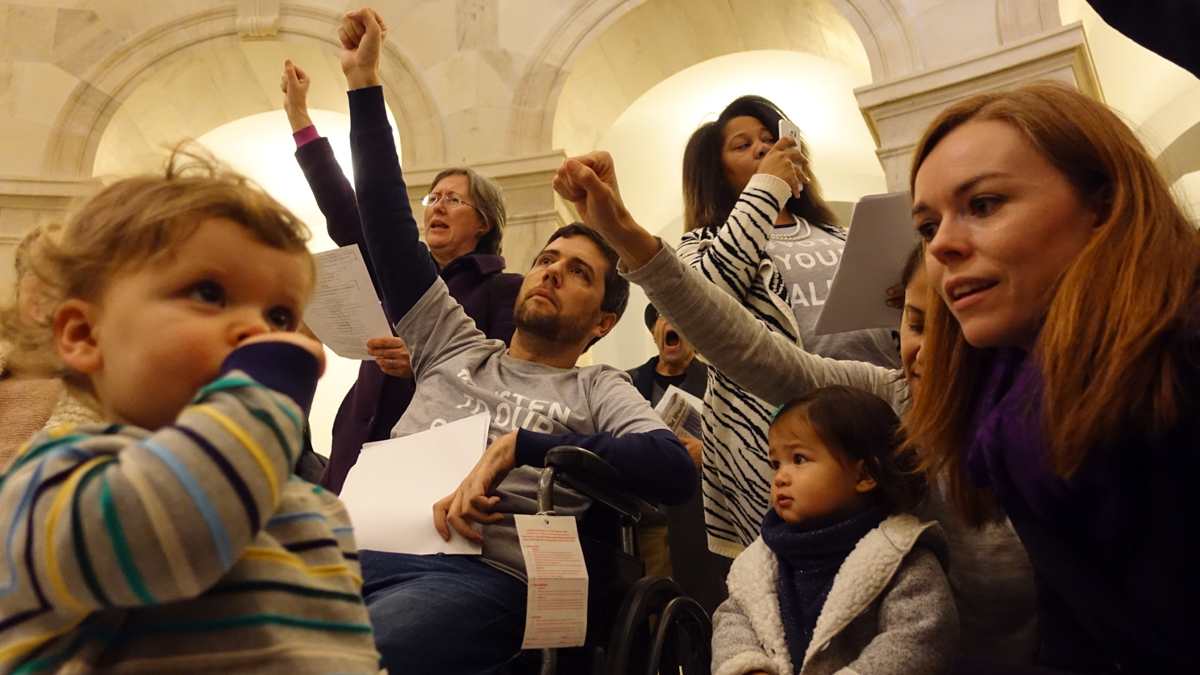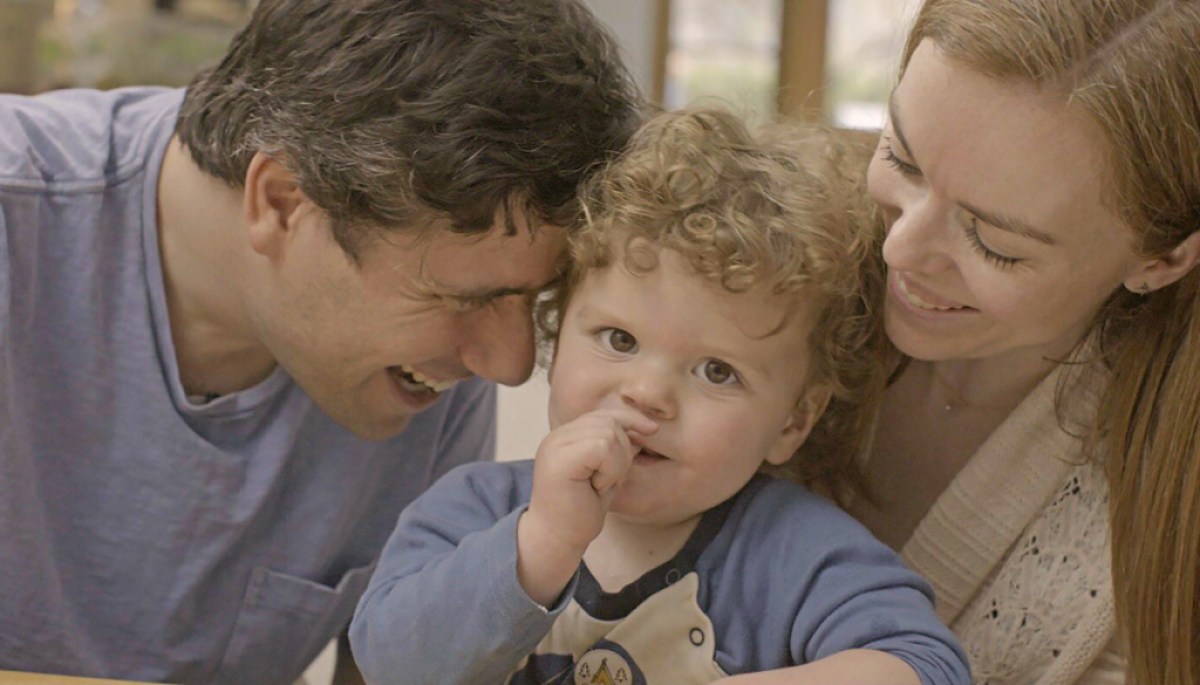Santa Barbaran Ady Barkan Fights for a Decent Health Care System
Diagnosed with a Fatal Disease, the Activist Leads the Charge for Medicare for All

They say the eyes are the window to the soul, and for Ady Barkan, it couldn’t be truer. Barkan was diagnosed three years ago with amyotrophic lateral sclerosis, or ALS — a disease that holds the body hostage by gradually paralyzing its muscles until finally ending the life of those in its grip. Already, he cannot speak, walk, or move most of his body, but his eyes are fully functional. The eye muscles are usually the last to go.
“The internet is a blessing for disabled activists,” the 35-year-old lawyer and activist said through his Eye Gaze tablet, which generates a robotic-sounding voice. The tablet uses technology to track his eye movements on a keyboard and spells out the words his eyes select. When asked a question, Barkan can take up to five minutes to respond through the tablet. “I hope to be useful and civically involved the rest of my life like other people do. I may just have to write more rather than traveling and campaigning.”
For Barkan, finding a way to cram a “30-year career into a couple years” is his top priority. From his Westside Santa Barbara home, he stays busy as a Medicare for All advocate, working to convert the U.S. health-care system into a single-payer model. He’s always been a progressive activist since his college days when he initially considered himself to be moderate. Then in law school, he began thinking that moderation in democracy wouldn’t spark the changes he believes are necessary and found himself leaning further left on a wide range of topics. But when he received the ALS diagnosis at 32, his advocacy became focused on America’s health-care system, and he decided Medicare for All was the solution.
But before that, he helped draft legislation when he was attending Yale Law that protected low-wage workers in New York City and won the right to paid sick days. He said it was as director of Fed Up that he feels he made the most impact, though. Fed Up is a campaign pushing the Federal Reserve to stop raising interest rates and instead “adopt all the policies necessary to rapidly reach a full employment economy.”
The highlight of this campaign came when Barkan and more than 100 Fed Up members were invited to meet with 11 Federal Reserve leaders at the Fed’s 2016 conference in Jackson Hole, Wyoming. Barkan had attempted to talk with members of the Federal Reserve at two previous conferences, and had never succeeded, but this was a historic meeting. It was the first time Fed leaders had ever been confronted by the people directly affected by their policies. Before Barkan formed the group, ordinary workers had no say in the debate on monetary policy. Today, the Fed is much more responsive to their concerns. “It was the proudest moment of my life as an advocate,” Barkan said.

“My proudest moment in life, though,” Barkan continued, “wasn’t in activism. It was when Rachael gave birth to Carl, but that was a different kind of pride.” Barkan is married to Rachael King, a professor of English at UCSB. They have a 3-year-old son together, Carl King, who was only four months old when Barkan was told he had an incurable disease. Although his words came through an artificial, robotic voice, light radiated from the father’s eyes as he heard his own words about his son’s birth play through the speaker. Doctors said Barkan would be lucky to see Carl’s fourth birthday.
His diagnosis came just two months after the Federal Reserve Conference — when it hit him how flawed the health-care system really is. Barkan, who had been paying into the system his entire adult life and was insured at the time of his diagnosis, found himself relying on the GoFundMe crowdfunding website to pay for his medical expenses.
“We will probably need to launch a new fundraising campaign soon,” King said about her husband’s medical bills. “The wheelchair-accessible van we have out front cost $30,000 and was paid for entirely by donations. We pay about $9,000 a month in out-of-pocket costs for his care now, but that just went up recently.”
Barkan realized about a year after his terminal diagnosis, when doctors were clear that he was likely to only live a few more years, that his deteriorating body could become his voice to sway politicians.
His rise to media stardom began unexpectedly in December 2017, when he happened to be on the same plane as Arizona Senator Jeff Flake, a lawmaker who was about to vote on the Republican tax-cut bill, a bill that would seriously reduce disability coverage for all Americans. “What should I tell my son, or what would you tell my son if you pass this bill and … I can’t get a ventilator?” Barkan asked Flake on the plane, just a few months before he lost the ability to speak. On the same plane, another passenger, Liz Jaff, recorded the conversation with Flake, and she posted it to Twitter.
The video went viral, and Barkan had media interview requests within an hour of the plane landing. Although Flake voted in support of the bill, which passed, Barkan’s conversation with him was still a success in a different way. The Center for Popular Democracy, the organization Barkan works for that launched the Fed Up campaign, used the attention from the viral video to launch the Be a Hero campaign, asking people to “be a hero and vote for candidates who protect healthcare.”

Though not well known before he talked with Flake, Barkan was certainly no stranger to lobbying congressional leaders. He has been arrested on Capitol Hill nine times, most recently during the Kavanaugh hearings, always protesting for the rights of those he feels are getting the short end of the stick. This April, Barkan went on his most recent voyage to Capitol Hill to testify at the first-ever Medicare for All hearing. Surrounded by supporters donning “Be a Hero” T-shirts, Barkan, speaking through his Eye Gaze tablet, told the congressional representatives: “Like so many others, Rachael and I have had to fight with our insurer, which has issued outrageous denials instead of covering the benefits we’ve paid for. We have so little time left together, and yet our system forces us to waste it dealing with bills and bureaucracy. That is why I am here today, urging you to build a more rational, fair, efficient, and effective system.”
Around the time of the hearing, he met Representative Salud Carbajal (D-CA), with whom he began pressing his case for a single-payer system, telling him about how he had formed a loosely connected group of like-minded people in Santa Barbara working toward the same goal. Carbajal was interested and sent them a list of 16 questions regarding the practical application of a Medicare for All plan. The questions covered topics such as women’s access to reproductive care under Republican-controlled government, pay-for mechanisms to recapture overpaid health insurance tax credits, new medical technology, coverage transitions, and health coverage regardless of immigration status.
Barkan and the coalition have worked to answer Carbajal’s concerns before he meets with the congressmember in Santa Barbara on June 28. Carbajal is an original co-sponsor of the Medicare for America Act. “I’m grateful to Ady for his activism, his commitment to improving our health-care system,” Carbajal said, “and for his advocacy and time in our ongoing conversation about Medicare for All.” Barkan hopes Carbajal will be on board because “constituents are in dire need of this law and we need a bold leader to do it.”

“I agree with Ady on a lot — there is no reason people should go into debt or forego crucial care due to the high cost of health care in this country,” Carbajal said about the coalition’s responses. “We need universal health coverage, and I’m open to a number of ways to get the job done. Ady’s responses to my questions about the practical application of Medicare for All were compelling and helpful, and I’m looking forward to continuing the conversation at our upcoming meeting.”
Lately, according to his wife, Barkan’s day starts with Carl coming in to say good morning and sitting on his lap before the first aide, Mario Diaz, comes in at 8 to help him get dressed. Around 10, another aide, Aiyana Sage, comes in and helps him with his work. He spends his time on the computer editing his memoir, responding to phone calls, and working on answering Carbajal’s questions. King described Barkan’s aides as his “round-the-clock team,” which has been a vital part of his continued work towards Medicare-for-All because she works full time at the university in addition to caring for their son, Carl.
“Everything takes a long, long time now,” Barkan said. “We have lots of visitors and employees in and out all the time. I’m trying to get as much done [as possible] in the time I have left.” But most importantly, Barkan is trying to create as many memories for Carl as he can. The family eats dinner together every night, and Carl sits on his father’s lap before his bedtime most nights as they listen to audiobooks together.
“Sick Ady is the only Ady Carl has ever known; it’s totally normal for him,” King said. Although Carl is too young to understand the idea of imminent death, he knows his father is sick. “He sometimes says his dad ‘needs help.’” Barkan said that ultimately, his work is the legacy he will leave behind for his son. “The problems in society are political, and we can fix them,” Barkan said. “The cure for democracy is more democracy. We just need to get involved to build the country Carl’s generation deserves.”
Barkan’s memoir, Eyes to the Wind, will go on sale this September.




You must be logged in to post a comment.